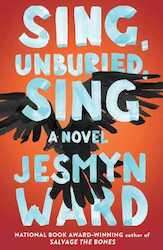
Sing, Unburied, Sing–Jesmyn Ward’s third novel, and her second to be awarded the National Book Award–is one of the best books of the year. But having read a couple of the other books up for the award, it would probably be my second choice. (Pachinko is still my Novel of the Year.)
It’s the story of a poor Mississippi family where the grandmother is dying of cancer, the grandfather is an emotional rock, the mother (an irresponsible junkie) lives for her equally irresponsible meth-dealer white husband, and their two children (JoJo 13 and the toddler Kayla) who are left to navigate a bizarre world mostly on their own. Much of the novel is a road trip Leonie and the kids make to collect the father Michael when he’s released from prison.
To complicate the dysfunctional family, the members through the grandmother’s line have various mystical powers, including for some of them the ability to understand what animals are thinking and the ability to see and speak with the ghosts hanging around. Yeah, it gets weird.
The reviewers who have linked Ward’s novel to Toni Morrison (especially in Beloved) and William Faulkner’s families of Yoknapatawpha County aren’t wrong. Both of those comparisons come readily to mind in Ward’s book, although I don’t know if it’s fair to Ward to force such comparisons.
I liked a great deal about the novel, not the least of which is Ward’s tremendous prose. But I wanted to love it more than I did and I’m struggling to articulate what made me hold back. Was it Richie’s story that threw me? Is it the ambivalence about Leonie’s choices? I don’t know. Maybe it was too open-ended for me and I’m not smart enough to be comfortable with that level of ambiguity?
Whatever it was, it left me with minor reservations. I suspect my tepid response will put me in the minority, but I’ve read both Morrison and Faulkner this year, so they’re fresh in my mind, and if you’re going to hold Ward to those standards, it’s a challenging comparison.
It’s the story of a poor Mississippi family where the grandmother is dying of cancer, the grandfather is an emotional rock, the mother (an irresponsible junkie) lives for her equally irresponsible meth-dealer white husband, and their two children (JoJo 13 and the toddler Kayla) who are left to navigate a bizarre world mostly on their own. Much of the novel is a road trip Leonie and the kids make to collect the father Michael when he’s released from prison.
To complicate the dysfunctional family, the members through the grandmother’s line have various mystical powers, including for some of them the ability to understand what animals are thinking and the ability to see and speak with the ghosts hanging around. Yeah, it gets weird.
The reviewers who have linked Ward’s novel to Toni Morrison (especially in Beloved) and William Faulkner’s families of Yoknapatawpha County aren’t wrong. Both of those comparisons come readily to mind in Ward’s book, although I don’t know if it’s fair to Ward to force such comparisons.
I liked a great deal about the novel, not the least of which is Ward’s tremendous prose. But I wanted to love it more than I did and I’m struggling to articulate what made me hold back. Was it Richie’s story that threw me? Is it the ambivalence about Leonie’s choices? I don’t know. Maybe it was too open-ended for me and I’m not smart enough to be comfortable with that level of ambiguity?
Whatever it was, it left me with minor reservations. I suspect my tepid response will put me in the minority, but I’ve read both Morrison and Faulkner this year, so they’re fresh in my mind, and if you’re going to hold Ward to those standards, it’s a challenging comparison.
 RSS Feed
RSS Feed
